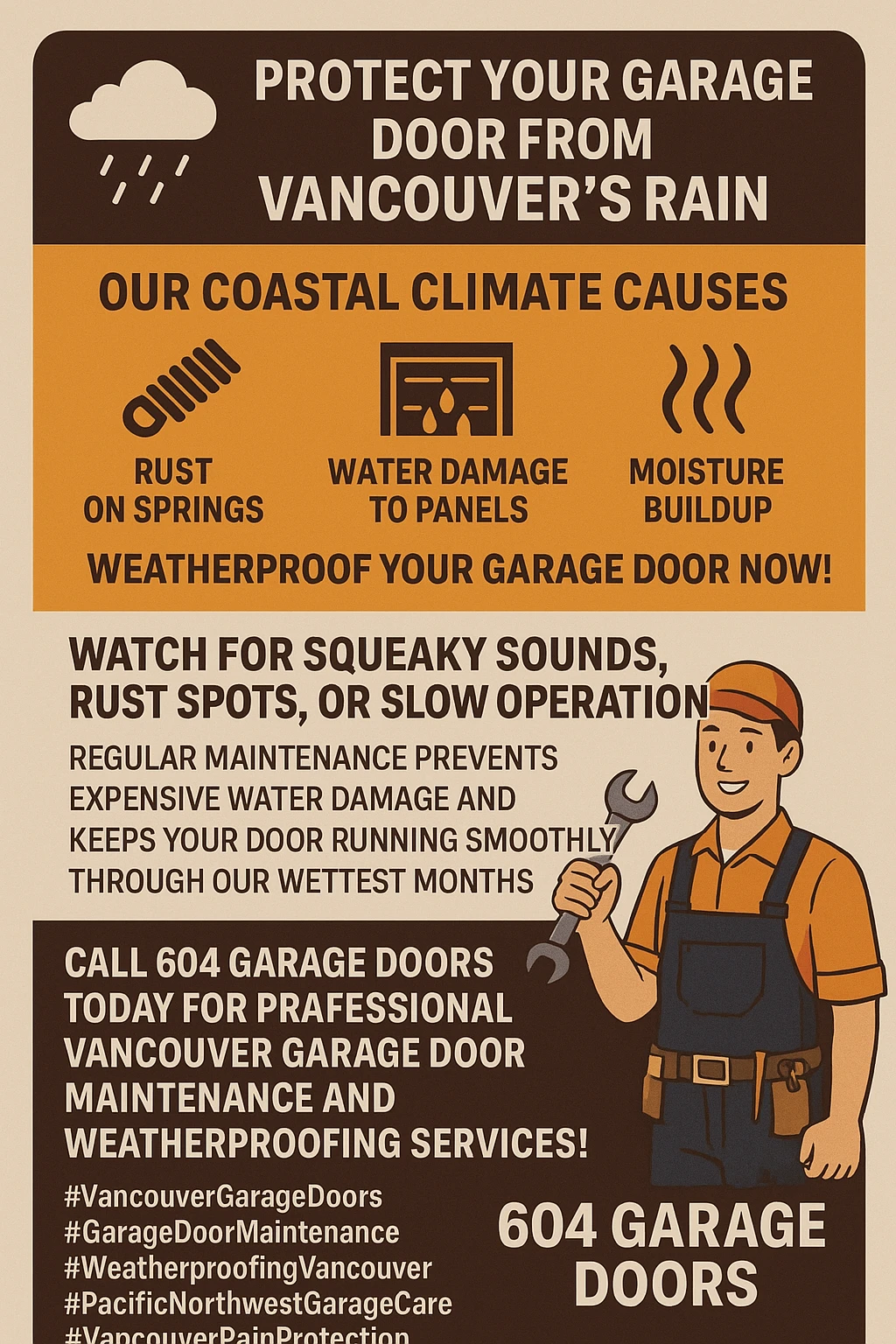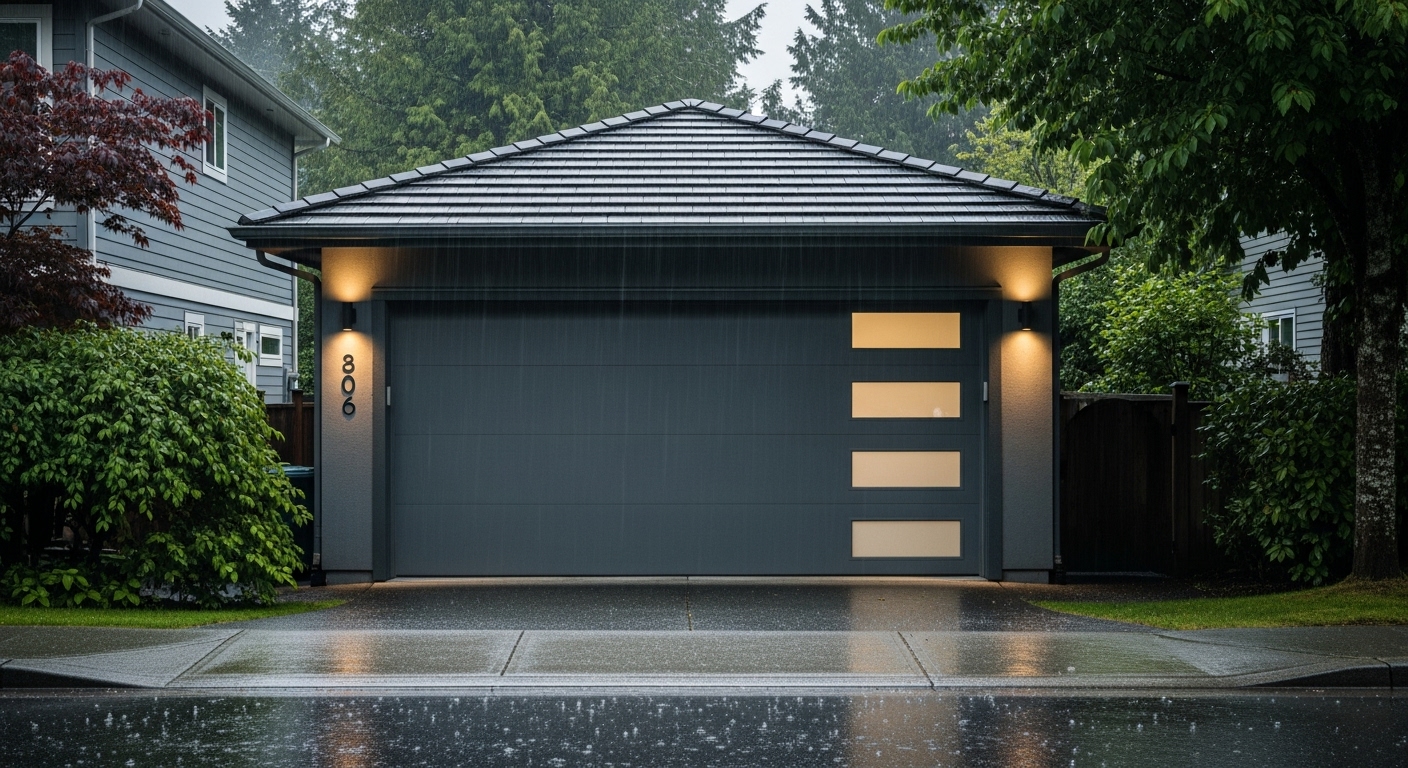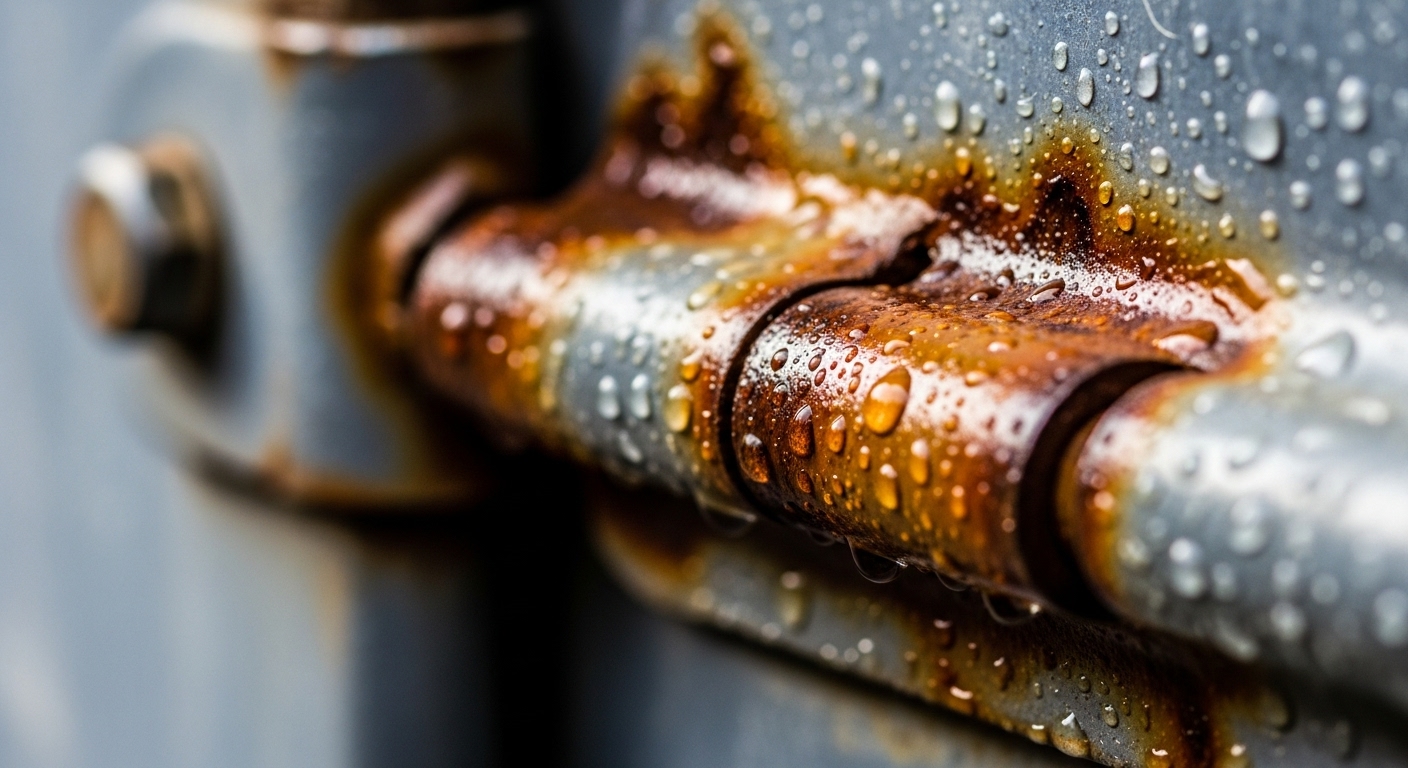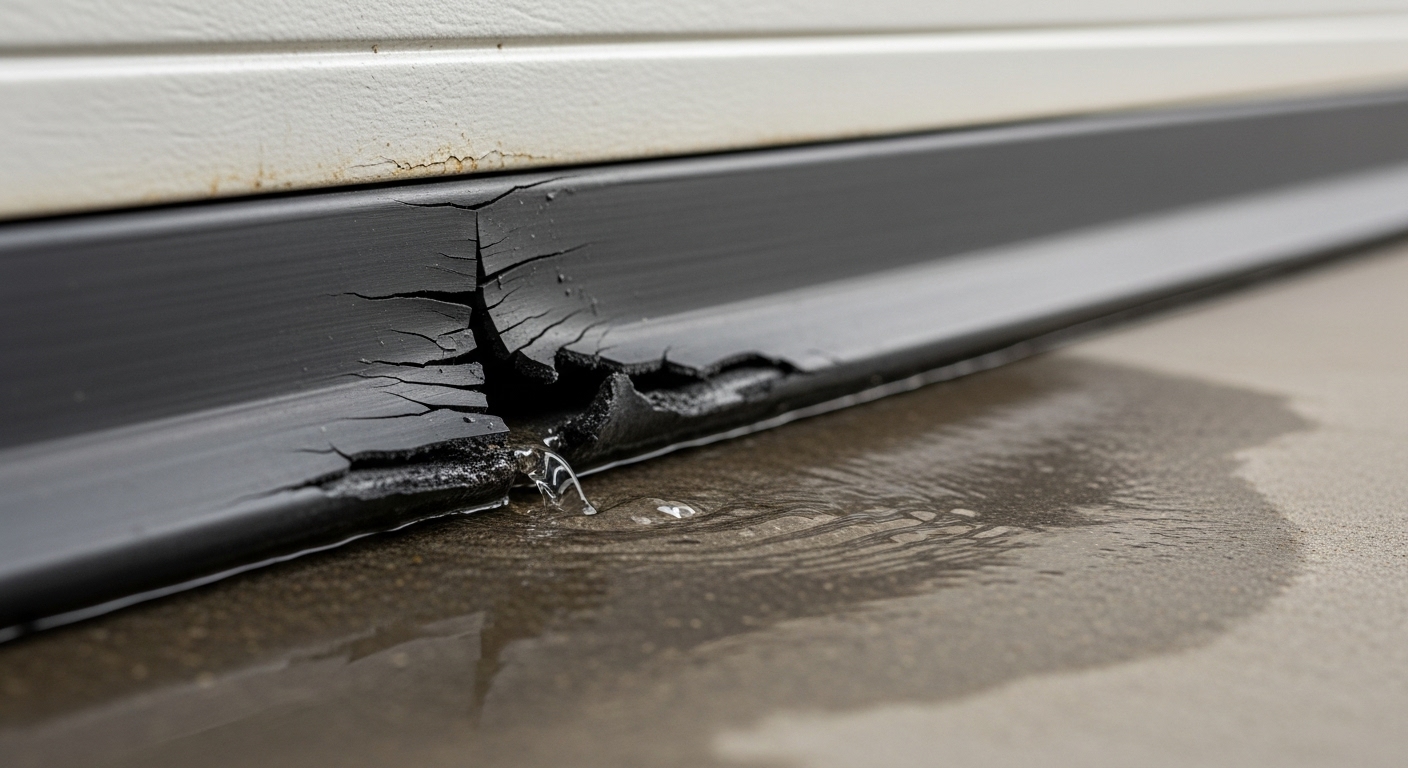How Vancouver’s Rainy Weather Damages Your Garage Door and What to Do About It
Wondering why your garage door seems to be fighting against Vancouver’s notorious weather every single day? You’re not alone – this coastal city’s relentless rain, salt air, and temperature swings create the perfect storm for garage door damage that can leave homeowners scrambling for solutions.
Living in Vancouver means accepting that rain is basically a full-time resident, but what many homeowners don’t realize is how this constant moisture marathon affects one of their home’s most frequently used moving parts. Your garage door isn’t just battling the obvious stuff like rust and water damage – it’s up against a complex mix of coastal challenges that can turn minor maintenance issues into major repair headaches faster than you can say “atmospheric river.” From salt air that speeds up corrosion to temperature swings that mess with your door’s mechanical components, Vancouver’s climate is basically designed to test every seal, spring, and sensor your garage door has.
The thing is, most of us treat our garage doors like that reliable friend who’s always there – until suddenly they’re not. But understanding how Vancouver’s unique weather patterns affect your garage door, and more importantly, knowing what to do about it, can save you from those panic-inducing moments when your door decides to take an unscheduled vacation. Whether you’re dealing with a door that’s starting to show its age or you want to get ahead of potential problems, getting familiar with the specific challenges our coastal climate presents is your first line of defense.
Here’s the reality check: Vancouver’s weather isn’t going to change, but how prepared you are for its effects on your garage door absolutely can. From preventive measures that actually work in our climate to knowing when it’s time to call in the professionals, we’re diving into everything you need to keep your garage door functioning smoothly through whatever Mother Nature throws at it.
Key Outtakes:
- Vancouver’s coastal climate creates a triple threat of constant moisture, salt air corrosion, and temperature fluctuations that can accelerate garage door deterioration by up to 40% compared to inland areas
- Preventive maintenance costs significantly less than emergency repairs, with professional weather stripping replacement running $60-$140 CAD versus potential full door replacement costs of $3,000-$8,000
- Regular bi-annual maintenance specifically timed for Vancouver’s climate patterns can extend your garage door’s lifespan by up to 50% and prevent costly spring failures
- Early detection through monthly visual inspections can catch moisture damage before it becomes a major structural issue requiring professional intervention
- Professional weatherproofing services provide measurable energy savings and long-term protection, with proper sealing reducing heat loss and lowering utility costs year-round

Understanding Vancouver’s Climate Impact on Your Garage Door
Vancouver’s weather isn’t just about getting caught without an umbrella – it’s a unique cocktail of conditions that your garage door has to deal with 24/7. We’re talking about nearly seven months of frequent rainfall annually, combined with that sneaky coastal salt air that’s constantly working to break down your door’s metal components. It’s like your garage door is stuck in a never-ending endurance test, and honestly, most of them aren’t winning.
The Pacific Northwest’s coastal weather patterns create this perfect storm of moisture exposure that goes way beyond just surface-level dampness. When you’ve got constant humidity levels mixing with temperature swings from 36°F in winter to 83°F in summer, every single component of your garage door system is expanding, contracting, and dealing with condensation on repeat. Metal springs get stressed, wooden panels start to warp, and those rubber seals you probably never think about? They’re working overtime just to keep water out of your garage.
But here’s where it gets really interesting – that salt air we get from living near the coast isn’t just making your car look grimy. It’s actively accelerating the corrosion process on your garage door’s hardware, springs, and tracks. Salt basically acts like a catalyst, speeding up rust formation and making what should be minor wear-and-tear issues into major repair situations. Even your garage door opener’s sensors and circuit boards can suffer damage from prolonged salt air exposure.

The temperature fluctuation piece is probably the most underestimated factor. When metal components contract in cold weather, you get alignment issues and spring tension problems. When they expand in warmer weather, clearances change and mechanical systems can bind up. It’s not unusual for garage doors in Vancouver to experience more spring failures during cold snaps than in other climates, simply because the constant temperature cycling puts extra stress on these critical components.
What makes Vancouver’s climate particularly challenging is how these factors work together rather than in isolation. You might have a wooden door that’s dealing with moisture absorption and swelling, while simultaneously fighting salt air corrosion on its hardware and temperature-related expansion issues. Professional garage door services in the area see this combination effect constantly, which is why local expertise becomes so important when dealing with weather-related garage door problems.
Common Weather Damage Types Vancouver Homeowners Face
Understanding the connection between Vancouver’s climate and garage door problems is one thing, but recognizing the actual damage when it shows up is where the rubber meets the road. The most common issue local homeowners deal with is rust and corrosion on metal components – and we’re not talking about just surface rust that you can sand off with some elbow grease. Vancouver’s salty, humid air creates deep corrosion that compromises the structural integrity of springs, hinges, and brackets.

Rust doesn’t just make your garage door look bad; it fundamentally changes how these components function. Corroded springs lose their tension consistency, rusty hinges create binding and noise, and deteriorated brackets can actually fail under load. The salt in our coastal air acts like an accelerant, turning what should be a slow oxidation process into something that can cause visible damage in just a few seasons. Even garage door openers suffer, with sensors becoming unreliable and circuit boards developing corrosion-related malfunctions.
Wooden garage doors face their own set of Vancouver-specific challenges, and water damage is the big one. When wooden doors absorb all that Pacific Northwest moisture, they don’t just get a little damp – they swell, warp, and can develop serious structural issues. The frame around a wooden door can swell to the point where clearances disappear entirely, causing the door to bind against the frame or become completely stuck. Worse yet, water-logged wooden doors become significantly heavier, putting extra strain on opener systems that weren’t designed to handle the additional weight.
Weather stripping deterioration is another massive issue that often gets overlooked until it’s too late. Those rubber seals around your door aren’t just there for show – they’re your first line of defense against moisture infiltration. Vancouver’s constant moisture and temperature fluctuations cause weather stripping to crack, shrink, and lose its elasticity. When these seals fail, water doesn’t just drip into your garage; it creates conditions for mold growth and can damage stored items, flooring, and even your home’s foundation if drainage is poor.
Sensor malfunctions are becoming increasingly common as garage door safety systems become more sophisticated. Rain, fog, and excessive moisture can cause photoelectric sensors to misalign or become obstructed, preventing doors from closing properly. Water droplets on sensor lenses can block infrared beams, causing frequent reversals or complete system failures. Professional water damage assessment often reveals that sensor problems are actually symptoms of broader moisture infiltration issues rather than isolated component failures.
One thing that catches a lot of Vancouver homeowners off guard is how weather damage can affect insurance claims. Documenting progressive deterioration with photos, maintenance records, and professional assessments becomes crucial because some manufacturer warranties actually cover defects like rust and cracking for up to 10 years – but only if you can prove regular professional servicing. The key is understanding that insurance companies often distinguish between sudden damage (like storm damage) and gradual deterioration (like rust from salt air), so having proper documentation can make the difference between a covered claim and an out-of-pocket expense.
Weatherproofing and Prevention Strategies

Now that we’ve covered what can go wrong, let’s talk about what you can actually do to protect your garage door from Vancouver’s relentless weather. The good news is that prevention really is more cost-effective than dealing with major repairs later – we’re talking about spending hundreds on weatherproofing


